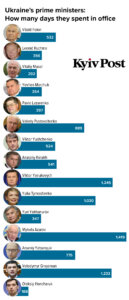The Ukrainian parliament has voted in Denys Shmygal, 44, as Ukraine’s new prime minister. On March 4, 291 lawmakers — mostly from the pro-presidential Servant of the People party — supported his nomination.
Shmygal succeeds Oleksiy Honcharuk, who resigned earlier the same day. The appointment comes amid a major government shakeup as President Volodymyr Zelensky attempts to speed up reforms.
Shmygal said that he understands the urgency and will soon present his program for “strategic reforms for the next several years.”
“People’s patience is running out,” he said, presenting his candidacy in parliament. “We need the reforms now.”
Honcharuk, the youngest prime minister in Ukraine’s history, has struggled with waning support from the president and parliament since tapes of him and other Cabinet members discussing the president in unflattering terms were leaked online earlier this year.
Appointed on Aug. 29, Honcharuk has also faced strong criticism for his slow delivery of promised reforms. Six months into the job, his Cabinet’s disapproval ratings were already well over 50%, according to the latest polls.
The decision to replace him with Shmygal likely represents an attempt to appoint a candidate with extensive management experience to lead the government.
Read More: Parliament accepts resignation of Prime Minister Honcharuk
Shmygal, a professional accountant, rose to prominence by working for energy company DTEK, owned by oligarch Rinat Akhmetov. He also briefly headed the economic department at the governor’s office of his native Lviv Oblast in 2009–2011. In June 2019, he was appointed governor of the neighboring Ivano-Frankivsk Oblast. On Feb. 4, he was appointed deputy prime minister and minister of regional development. Exactly one month later, he became prime minister.
Shmygal was later handpicked by Zelensky to become Ukraine’s 18th prime minister and the second appointed by Zelensky-controlled parliament.
Another technocrat
Like his predecessor, Shmygal is relatively unknown to the wider public. After receiving an economics degree from Lviv Polytechnic Institute back in 1997, he worked as an accountant and later economist in various companies in his native Lviv.
In 2009, Shmygal took a job leading the economic department of the Lviv Oblast government. His department was also tasked with attracting investments into the region. He left the regional government in 2014 to run for parliament as an independent candidate through a Lviv single-member district, yet received less than 1% of the vote.
In 2015, he ran for a seat in the Lviv Oblast Council, yet once again fell short. After a brief stint as head of a local retail chain, in 2017 Shmygal took a job at DTEK.
He became deputy head of DTEK Zahidenergo, a regional energy company that produces over 9% of Ukraine’s electricity. A year later, he took charge of one of its power plants situated in Ivano-Frankivsk Oblast.
In the past, former employees of DTEK have gone on to serve as proxies for Akhmetov in government and politics.
That said, according to Shmygal, he was chosen through an open tender procedure and didn’t have any substantial ties with Akhmetov during his work for DTEK.
“I saw Rinat Akhmetov the same way as you do, on television,” Shmygal said in July during an interview with a local news outlet after he was appointed governor of Ivano-Frankivsk Oblast.
“I never had an opportunity to talk with him in real life.”
After Zelensky’s inauguration in May, Shmygal was among the three candidates offered to become governor of Lviv Oblast. Zelensky created an online poll to let the public decide who should become the governor. Shmygal lost.
However, less than a month later, he was appointed head of the neighboring oblast.
During his time as governor, he was publicly praised by Zelensky, who called Shmygal a “powerful manager.”
In early February, after Olena Babak, minister of regional development, resigned, Shmygal took her place. He was also given the vacant deputy prime minister position.
Cold welcome
Representatives of opposition gave the new prime minister a cold welcome: They demanded that he submit his candidates for the Cabinet not as a package, but as separate candidates, leaving space for discussion. This request especially targets Arsen Avakov, who has been the interior minister since 2014 and is about to enter his fifth Cabinet.
In response, Shmygal said that he has to submit candidates as one package because of legislation regulating the work of the Verkhovna Rada. Dmytro Razumkov, speaker of the Rada, backed him up.
However, this is not true: The law on the Cabinet of Ministers leaves both options open — candidates for ministers can be submitted separately or as a package.
Presenting his candidacy for prime minister to lawmakers on March 4, Shmygal thanked Zelensky for placing his trust in him.
“If the new Cabinet doesn’t perform, it will be out. We understand that well,” Shmygal said, referring to Honcharuk’s resignation after six months in office. “We saw it today.”

